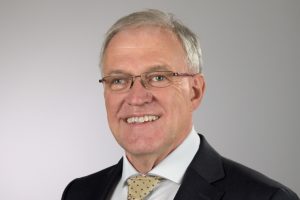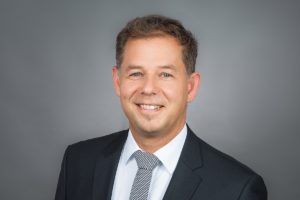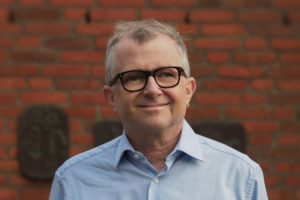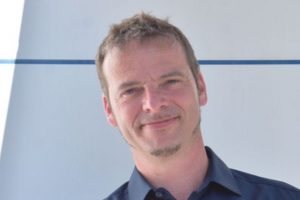
Shashank Priya (Principal Investigator) is Professor in department of materials science and engineering at Penn State University and Associate Vice-President for Research and Director of Strategic Initiatives. At Penn State, he is also leading the development of Veterans Education and Research Center (VERC), Commonwealth Campus Shared Facility Program, International Institute for Biosensing (IIB). His research is focused in the areas related to multifunctional materials, energy and bio-inspired systems. His recent focus has been designing and implementing self-powered systems. He has published over 375 peer-reviewed journal papers and more than 60 conference proceedings covering these topics. Additionally, he has published more than five US patents, and ten books. He is the founder and chair of the Annual Energy Harvesting Society Meeting and founding president of Energy Harvesting Society. He is serving as the member of the Honorary Chair Committee for the International Workshop on Piezoelectric Materials and Applications (IWPMA). Shashank has received several awards including: Alumni award for excellence in Research 2014, Fellow American Ceramic Society 2013, Turner Fellowship 2012, Dean’s Research Excellence Award 2011, and AFOSR Young Investigator Award.
 Clive A. Randall (Co-Principal Investigator) is a Professor of Materials Science and Engineering and the Director of Materials Research Institute at The Pennsylvania State University, University Park, Pennsylvania, USA. He was Director for the Center for Dielectric Studies between 1997 and 2013, and in 2013 formed a new Center as Co-Director, the Center for Dielectrics and Piezoelectrics, for which he still serves as Technical Advisor. Prof. Randall received a B.Sc. with Honors in Physics in 1983 from the University of East Anglia, and a Ph.D. in Experimental Physics from the University of Essex in 1987, both in the United Kingdom. He has authored/co-authored over 360 technical papers, with over 11,000 citations and an h-factor of 56. He also holds 13 patents (with 1 pending) in the field of electroceramics. Prof. Randall’s research interests are in the area of discovery and compositional design of functional materials for electrical energy transduction and storage, defect chemistry and crystal chemistry and their impact on phase transition behavior, electromechanical devices based upon electrostriction and piezoelectrics, supercapacitors, thermoelectrics, and microwave materials. He has used a variety of different processing and characterization methods that have impacted manufacturing and development processes for materials, particularly in the capacitor industry.
Clive A. Randall (Co-Principal Investigator) is a Professor of Materials Science and Engineering and the Director of Materials Research Institute at The Pennsylvania State University, University Park, Pennsylvania, USA. He was Director for the Center for Dielectric Studies between 1997 and 2013, and in 2013 formed a new Center as Co-Director, the Center for Dielectrics and Piezoelectrics, for which he still serves as Technical Advisor. Prof. Randall received a B.Sc. with Honors in Physics in 1983 from the University of East Anglia, and a Ph.D. in Experimental Physics from the University of Essex in 1987, both in the United Kingdom. He has authored/co-authored over 360 technical papers, with over 11,000 citations and an h-factor of 56. He also holds 13 patents (with 1 pending) in the field of electroceramics. Prof. Randall’s research interests are in the area of discovery and compositional design of functional materials for electrical energy transduction and storage, defect chemistry and crystal chemistry and their impact on phase transition behavior, electromechanical devices based upon electrostriction and piezoelectrics, supercapacitors, thermoelectrics, and microwave materials. He has used a variety of different processing and characterization methods that have impacted manufacturing and development processes for materials, particularly in the capacitor industry.

Susan Trolier-McKinstry (Co-Principal Investigator) is a professor of ceramic science and engineering at The Pennsylvania State University, where she also serves as the director of the W. M. Keck Smart Materials Integration Laboratory and co-director of the Nanofabrication Facility. She obtained BS, M, and PhD degrees in Ceramic Science and Engineering, all from Penn State. Upon graduation, she joined the faculty there. She is a fellow of IEEE and the American Ceramic Society, and is an academician of the World Academy of Ceramics. She was also the recipient of National Security Science and Engineering Faculty Fellowship, the IEEE Ferroelectrics Achievement Award, and the Ceramic Education Council Outstanding Educator Award, among others. Her main research interests include thin films for dielectric and piezoelectric applications. Her group studies the fundamental mechanisms that contribute to the measured properties, processing studies for electroceramic films, and integration of functional materials into microelectromechanical systems. She has co-authored >320 papers in these areas, and has several patents. Twenty former members of her group are now faculty members around the world; others have taken jobs with companies and national laboratories.

Long-Qing Chen is Distinguished Professor of Materials Science and Engineering and Professor of Engineering Science and Mechanics at the Pennsylvania State University. He is a short-term visiting Professor of Materials Science and Engineering at Tsinghua University under the short-term 1000-Scholar program, a guest Professor of Materials Science and Engineering at Zhejiang University, and a guest Professor of Physics at the Beijing University of Science and Technology in China. He received his BS degree in Materials Science and Engineering from Zhejiang University in China in 1982. After spending one year as an assistant instructor at Zhejiang University, he came to the United States in 1983 and received his M degree in Materials Science and Engineering from the State University of New York at Stony Brook in 1985 and a PhD degree in Materials Science and Engineering from the Massachusetts Institute of Technology (MIT) in 1990. After a two-year post-doc appointment with Professor Armen G. Khachaturyan at Rutgers University, he joined the faculty at Penn State as an Assistant Professor of Materials Science and Engineering in 1992. He was promoted to Associated Professor in 1998 and Professor in 2002.
 Franz Faupel received his Ph.D. in physics from the University of Göttingen in 1985. He was a postdoctoral fellow at the IBM Research Center Yorktown Heights and got his habilitation in 1992. Since 1994, he holds the Chair for Multicomponent Materials at Kiel University. Dr. Faupel is Chairman of the North German Initiative Nanotechnology and has served on various editorial boards. He has published more than 300 papers which have received more than 10,000 citations (h=50, Google Scholar, 11/2018). His research interests include functional nanocomposites, magnetoelectric sensors, and plasma deposition.
Franz Faupel received his Ph.D. in physics from the University of Göttingen in 1985. He was a postdoctoral fellow at the IBM Research Center Yorktown Heights and got his habilitation in 1992. Since 1994, he holds the Chair for Multicomponent Materials at Kiel University. Dr. Faupel is Chairman of the North German Initiative Nanotechnology and has served on various editorial boards. He has published more than 300 papers which have received more than 10,000 citations (h=50, Google Scholar, 11/2018). His research interests include functional nanocomposites, magnetoelectric sensors, and plasma deposition.
 Martina Gerken received the Dipl.-Ing. degree in electrical engineering from the University of Karlsruhe,
Martina Gerken received the Dipl.-Ing. degree in electrical engineering from the University of Karlsruhe,
Germany, in 1998, and the Ph.D. degree in electrical engineering from Stanford University, Stanford, CA,
USA in 2003. From 2003 to 2008 she was an Assistant Professor at the University of Karlsruhe, Germany.
In 2008 she was appointed as a full Professor of electrical engineering and head of the Integrated
Systems and Photonics Group at Kiel University, Germany. She is steering committee member of the
Collaborative Research Center CRC 1261 “Magnetoelectric Sensors: From Composite Materials to
Biomagnetic Diagnostics”, management committee member of the Compentence Center on Nanosystems Technology, and co-founder of the spin-off Byonoy GmbH.

Dr. Venkatraman Gopalan is Professor of Materials Science and Engineering and Physics at Pennsylvania State University. He received his B.Tech. in Metallurgical Engineering from the Indian Institute of Technology, Chennai, in 1989, and his Ph.D. in Materials Science and Engineering from Cornell University in 1995. He was a postdoctoral scholar in the Electrical and Computer Engineering Department at the Carnegie Mellon University from 1995-1996, and was subsequently awarded a director-funded postdoctoral fellowship at the Los Alamos National Laboratory, where he performed research on ferroelectrics and electro-optics till 1998. He joined Penn State as an assistant professor in December 1998, and became a full professor in 2007. He has been awarded the National Science Foundation CAREER award (2000), Robert R. Coble Award from The American Ceramic Society (2002), Corning Faculty Fellowship in Ceramic Sciences (2004), National Research Council Faculty Fellowship (2004), Wilson Award for excellence in research (2005), Eshbach Faculty Fellow at the Northwestern University (2007), Richard M. Fulrath Award from The American Ceramic Society (2009), Faculty Scholar Medal from Penn State (2012).
 Jon-Paul Maria is a Professor of Materials Science and Engineering at The Pennsylvania State University and a Professor Emeritus at North Carolina State University where he spent 15 years serving on Materials Science and Engineering faculty. Prior to joining NCSU, Professor Maria received his BS, MS, and Ph.D. degrees from Penn State in Ceramic Science. Jon-Paul’s research group pursues new materials discovery, property engineering, advances in synthesis science, and new integration strategies to merge diverse materials. Laboratory activities of interest include physical vapor deposition, ceramic synthesis by powder processing, structural characterization by diffraction, and microstructure measurement using scanning probe and scanning electron microscopy.
Jon-Paul Maria is a Professor of Materials Science and Engineering at The Pennsylvania State University and a Professor Emeritus at North Carolina State University where he spent 15 years serving on Materials Science and Engineering faculty. Prior to joining NCSU, Professor Maria received his BS, MS, and Ph.D. degrees from Penn State in Ceramic Science. Jon-Paul’s research group pursues new materials discovery, property engineering, advances in synthesis science, and new integration strategies to merge diverse materials. Laboratory activities of interest include physical vapor deposition, ceramic synthesis by powder processing, structural characterization by diffraction, and microstructure measurement using scanning probe and scanning electron microscopy.
 Eckhard Quandt is a professor in Materials Science at the University of Kiel since 2006. From
Eckhard Quandt is a professor in Materials Science at the University of Kiel since 2006. From
2014 to 2016, he was Dean of the Faculty of Engineering. He is a member of the review board
“Materials Science” of the DFG and member of the German National Academy of Science
and Engineering (acatech). In addition, he is speaker of the Collaborative Research Center
CRC 1261 “Magnetoelectric Sensors: From Composite Materials to Biomagnetic Diagnostics”,
co-founder of the spin-off Acquandas GmbH, and Chairman of the Board of Trustees of the Fraunhofer Institute for Silicon Technology.
 Dr. Qiming Zhang is a Distinguished Professor of Electrical Engineering at The Pennsylvania State University in University Park, Pennsylvania. He received a BS degree in electronic physics from Nanjing University, China, and a PhD degree in solid state physics from Penn State. Dr. Zhang joined Penn State in 1991. His research area is in novel electronic materials, especially soft electronic materials and ferroelectric based materials, and their device applications. The research conducted in his group covers a broad range of applications of solid state electronic materials such as electromechanical, dielectric, photonic and electro-optic, and pyroelectric applications. His work has been supported by the National Science Foundation, the Office of Naval Research, the Defense Advanced Research Projects Agency, the National Institute of Health, and many industrial companies.
Dr. Qiming Zhang is a Distinguished Professor of Electrical Engineering at The Pennsylvania State University in University Park, Pennsylvania. He received a BS degree in electronic physics from Nanjing University, China, and a PhD degree in solid state physics from Penn State. Dr. Zhang joined Penn State in 1991. His research area is in novel electronic materials, especially soft electronic materials and ferroelectric based materials, and their device applications. The research conducted in his group covers a broad range of applications of solid state electronic materials such as electromechanical, dielectric, photonic and electro-optic, and pyroelectric applications. His work has been supported by the National Science Foundation, the Office of Naval Research, the Defense Advanced Research Projects Agency, the National Institute of Health, and many industrial companies.
 Gerhard Schmidt has been a Professor (W3) for “Digital Signal Processing and System Theory” at the Faculty of Engineering of the CAU Kiel since 2010.
Gerhard Schmidt has been a Professor (W3) for “Digital Signal Processing and System Theory” at the Faculty of Engineering of the CAU Kiel since 2010.
 Rainer Adelung is a professor for Materials Science (Heisenberg Professorship) at Kiel University since 2007. Before that, he was an academic assistant at the Institute for Materials Science at CAU. He was born in Detmold, Germany and obtained his doctoral degree in 2000 at CAU, habilitation in 2006.
Rainer Adelung is a professor for Materials Science (Heisenberg Professorship) at Kiel University since 2007. Before that, he was an academic assistant at the Institute for Materials Science at CAU. He was born in Detmold, Germany and obtained his doctoral degree in 2000 at CAU, habilitation in 2006.
 Dr. Jeffery McCord is a professor in the department of materials science at Kiel University. He holds a BS and M degree in materials science at the University of Erlangen-Nürnberg, where he also did his Ph.D. working on magnetic thin films. From 1997 to 2001 he was with the IBM Storage Division in San Jose, developing magnetic recording heads. From 2002 to 2009, he was a research scientist and Group Leader of the IFW Dresden, until he took over a position as the Head of Department Nanomagnetism at the Helmholtz-Zentrum Dresden-Rossendorf. He is Co-Founder and served as the Director of evico magnetics GmbH. He joined the University of Kiel as a Heisenberg-Professor of materials science in 2011. His primary research interests include magnetic domains and magnetic materials. The topics of research range from fundamental research to engineering materials and devices, concentrating on magnetization dynamics, exchange bias, magnetic thin films, and nanomagnetism.
Dr. Jeffery McCord is a professor in the department of materials science at Kiel University. He holds a BS and M degree in materials science at the University of Erlangen-Nürnberg, where he also did his Ph.D. working on magnetic thin films. From 1997 to 2001 he was with the IBM Storage Division in San Jose, developing magnetic recording heads. From 2002 to 2009, he was a research scientist and Group Leader of the IFW Dresden, until he took over a position as the Head of Department Nanomagnetism at the Helmholtz-Zentrum Dresden-Rossendorf. He is Co-Founder and served as the Director of evico magnetics GmbH. He joined the University of Kiel as a Heisenberg-Professor of materials science in 2011. His primary research interests include magnetic domains and magnetic materials. The topics of research range from fundamental research to engineering materials and devices, concentrating on magnetization dynamics, exchange bias, magnetic thin films, and nanomagnetism.
 Dirk Meyners has been research assistant in the working group “Inorganic Functional Materials” of professor Eckhard Quandt since 2007. Before that, he was a research assistant at the Center of Advanced European Studies and Research in Bonn and at Bielefeld University. He earned his PhD at Bielefeld University in magnetostrictive logic circuits in 2006.
Dirk Meyners has been research assistant in the working group “Inorganic Functional Materials” of professor Eckhard Quandt since 2007. Before that, he was a research assistant at the Center of Advanced European Studies and Research in Bonn and at Bielefeld University. He earned his PhD at Bielefeld University in magnetostrictive logic circuits in 2006.

The mission of The American Ceramic Society (ACerS) is to advance the study, understanding, and use of ceramics and related materials, for the benefit of our members and society. More than 11,000 scientists, engineers, researchers, manufacturers, plant personnel, educators, students, marketing and sales professionals from more than 70 countries make up the members of The American Ceramic Society.